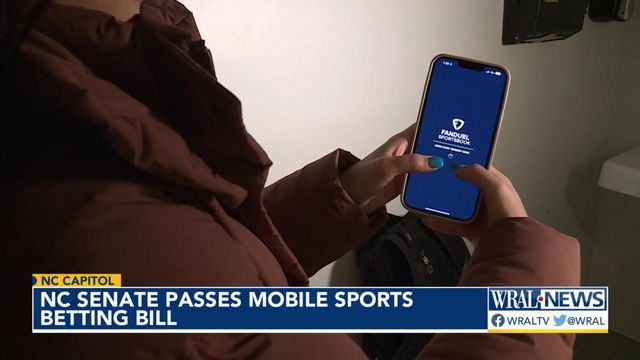Senate gives final approval to sports betting bill; House to concur
Online sports gambling in North Carolina is less than a week away from passing the state legislature, House Speaker Tim Moore said Thursday.
Posted — UpdatedLegal online sports betting is closer than ever to becoming a reality in North Carolina.
"There had been a great deal of energy put into crafting the bill," said Senate leader Phil Berger, R-Rockingham, a supporter of the bill. "The members here that had been working on those changes had been working with sponsors in the House and had received some assurances that if you do that, we're going to ask that concurrence take place. So I think they were a little bit taken aback by what seemed to be the initial word that they were not going to concur."
The bill allows betting on professional, college and other sports, including horse racing, beginning no sooner than Jan. 8. The state will award 12 operator licenses and tax operators' gross gaming revenue at 18%. Projections estimate more than $6.6 billion to be bet in the state within three years and tax revenue could eclipse $100 million by the fifth year.
The state's budget is roughly $30 billion.
PNC Arena, home of the NHL's Carolina Hurricanes and NC State men's basketball team, is among eight facilities that would be allowed to open an in-person sports book.
Philip Isley, the chairman of the Centennial Authority which owns PNC Arena in Raleigh, said there could be two sports books on the property, one inside and one outside "should we choose to do it. I think we will."
Moore said he wants to see any potential casino bill combined with a proposal to legalize video lottery terminals. Moore said the lawmakers are considering the creation of four "entertainment districts," which would include full Vegas-style casinos, in economically struggling parts of the state.
"Those are communities that have been talked about," he said.
Berger said the communities would be offered a chance to affirm the decision to have a casino. Whether that would be a vote by citizens or by some governmental group, like the county commissioners, was less clear.
"It would be important that there be some affirmation from the locality that they would like a casino if, in fact, we get to that point," he said.
No legislation on casinos or "entertainment districts" has been introduced.
"We're a lot closer than we've ever been," Berger said. "There are still some fairly significant hurdles. First, what would a bill look like? So we're not there, but there are conversations taking place."
Where the money goes
The bill allocates money from license fees and taxes to several different areas after the Department of Revenue and Lottery Commission receive money for expenses.
- $2 million annually for Department of Health and Human Services for gambling addiction education and treatment programs.
- $1 million annually to North Carolina Amateur Sports for grants to local governments or non-profit organizations to expand opportunities for youth sports participation. Organizations in a single county can receive no more than 1% of the total funding.
- $300,000 to the athletic departments at Appalachian State, East Carolina, Elizabeth City State, Fayetteville State, North Carolina A&T, North Carolina Central, UNC-Asheville, UNC-Charlotte, UNC-Greensboro, UNC-Pembroke, UNC-Wilmington, Western Carolina and Winston-Salem State.
- $1 million to the North Carolina Heritage Advisory Council for grants to assist youth teams travel to events or attract events to North Carolina.
- Of the remaining proceeds: 20% to the athletic departments at the above colleges and universities; 30% to the North Carolina Major Events, Games and Attractions Fund; 50% to the state's General Fund. The Major Events, Games and Attractions Fund would provide grants to draw entertainment, musical, political, sporting or theatrical events, held no more than once a year, to the state's sports facilities and venues.
Related Topics
• Credits
Copyright 2024 by Capitol Broadcasting Company. All rights reserved. This material may not be published, broadcast, rewritten or redistributed.






